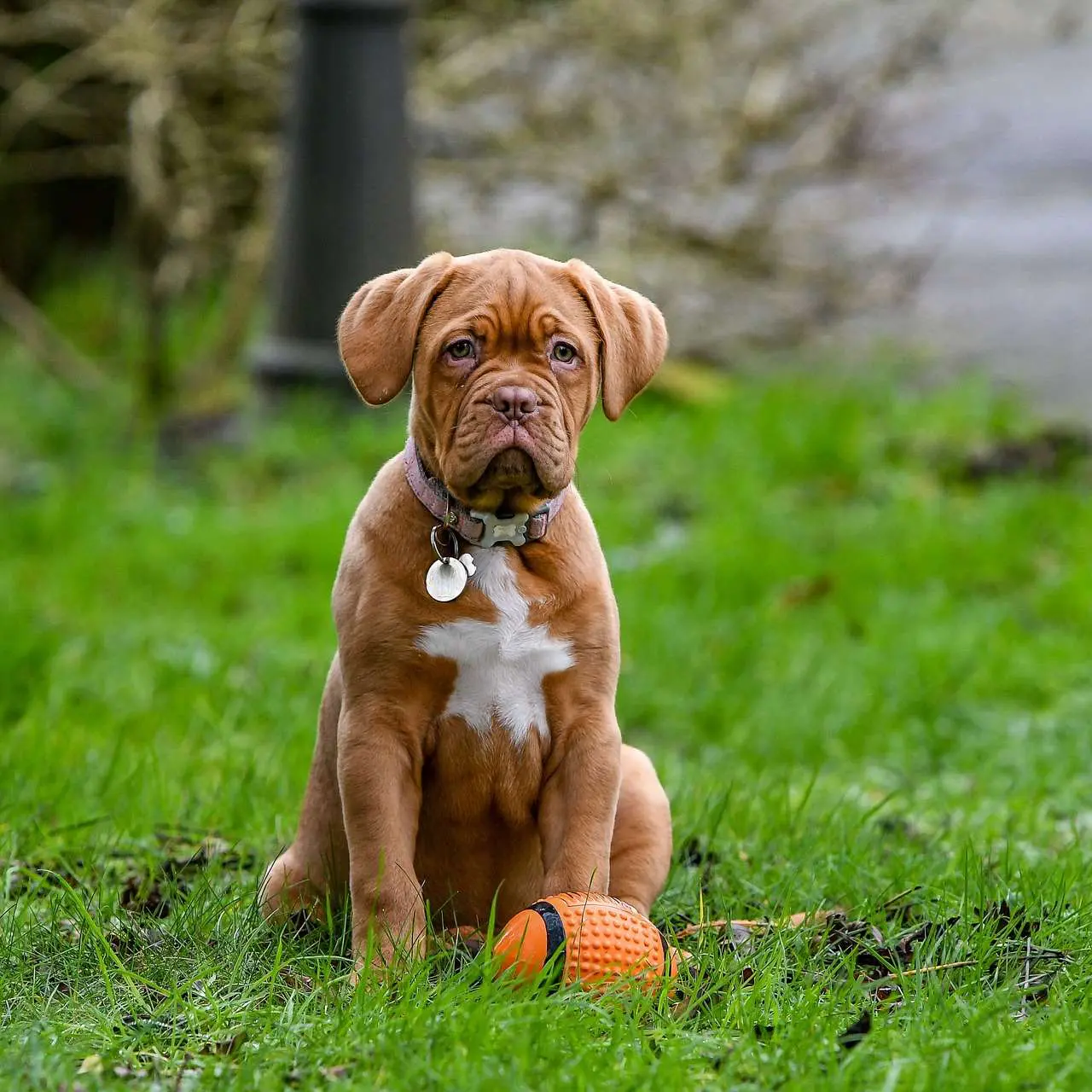Making Dogue de Bordeaux Training Easy

Dogue de Bordeaux training can be a rewarding and engaging endeavour for both owner and dog. Good behaviour helps build a strong bond and a loving, lasting companionship.
As part of the worker group, the Dogue de Bordeaux (French Mastiff) loves to take on jobs and also has a strong motivation to please its owners. This combination can work wonders when it comes to training your Dogue de Bordeaux.
That said, despite the calm nature of this breed later in life, their sheer size and dominance (like other members of the Mastiff family), can initially lead to this breed being quite stubborn. It is not uncommon for this breed to pull on the lead or jump up. This can be quite scary for many, simply because of the large, heavy intimidating appearance.
Let’s face it, when it comes to Dogue de Bordeaux training, you don’t want a Hooch mark 2 roaming around your living room, chewing up your furniture and jumping up at the mailman.
Owners will benefit from developing a calm but commanding leadership presence which may come from previous dog ownership experience or coaching from a local training group. Obedience training is a must for this breed, from an early age.
If trained correctly and socialised from an early age, this magnificent breed can make for a wonderful and loyal family dog. The large headed, gentle giant will benefit from the following tips.
At what age should you start to train your Dogue de Bordeaux?
You should start to training your French Mastiff as early as possible. If you’re lucky, a good breeder that is actively involved in nurturing puppies may have set in place some early training systems that make your life a whole lot easier. I remember getting my DDB puppy from the breeder at 10 weeks old, to find out that it was already (mostly toilet trained). Result!
For most, training should start to occur around the 8-10 week mark. As mentioned above, the breed can be a challenge to train at first so the earlier you start, the better.

Owners should start with basic obedience training. Basic commands such as sit, stay, down, come and no should be prioritised at this phase. However, patience is required as your DDB isn’t going to learn everything in one session.
As your Dogue de Bordeaux matures, you should look to make your obedience training more advanced. This should start to occur around the 5-6 month mark. At this point, you can start to introduce new commands such as heel, wait, leave.
Basic obedience training is a must for this breed. Once your dog has a good grasp on these commands, owners can look to introduce other forms of training such as tasks, agility, etc. However, there are also other aspects to consider such as socialisation, of which we will get into later.
Training your Dogue de Bordeaux at home
Training your Dogue de Bordeaux at home is typically the preferred option for many owners. Not only is this more cost effective, it is also more comfortable for your dog.
This environment is essential for basics such as toilet training and ensuring your dog doesn’t break and ruin your prized household possessions.
That said, owners relying exclusively on training their Dogue de Bordeaux in their house may be missing out on other critical areas of development which can be learned from puppy training classes or doggy day care.
Training your Dogue de Bordeaux at puppy classes
Yes it’s an extra expense, but puppy training classes can enrichen the training experience of your Dogue de Bordeaux. Not only is your DDB getting classes from an experienced handler, it may also get the opportunity to socialise with other dogs which is highly encouraged for all breeds but especially so for guardian dogs such as the French Mastiff.
Typically, many places offer a variation of 1-2-1 training, boot camps or open classes. These are a great way to gain expert insights into strict obedience training alongside more advanced training for the breed. These are especially worthwhile for owners that may be experiencing behaviour based issues with the breed, such as:
- Excessive barking
- Pulling on the lead
- Lunging at other animals
- Jumping up at people
- General aggression
- Running away
Owners (experience or not) need to show a degree of humility and openness when engaging with external training classes. Research should also be undertaken to find the best trainers in your area, this may be a great question to ask your vet or even your breeder.
More on Potty training a Dogue de Bordeaux
Toilet training for your Dogue de Bordeaux usually starts from 8 weeks, however your breeder may have put in some early groundwork for you.
When it comes to toilet training your French Mastiff, you should look to invest in “crate training”. The Dogue de Bordeaux is a sanitary breed, meaning if they’re crate trained then they’re not going to tolerate sitting in their own faeces and urine.
The crate is a terrific tool for many breeds in general. It gives them a safe space to relax and escape, a “den” if you will. You want to make the crate it’s personal haven, do not use it as a sense of punishment (doggy jail). You can achieve this by placing its comfortable bedding in there, a favourite chew toy and even use it as a place to feed snacks.
For a breed the size of a Dogue de Bordeaux, we recommend going for a large crate (around 48” if possible). This can usually be a one time purchase, don’t worry about starting with a smaller size for puppyhood, just go straight for the large one.

A sense of vigilance is very necessary when toilet training your Dogue de Bordeaux in the early days. Keep your eyes peeled for over circulating a particular area, lots of sniffing, and when they begin to squat. As soon as you spot that, you then want to lead your Dogue outside.
If your dog takes the hint and does its business outside, then you should lavish praise. Do this enough times and your dog should start to get the hint. As time progresses, you can start to create a cue for toilet time so that your dog starts to understand what you want them to do. Again, if they start to get the hint then you can heap praise on them.
We also suggest sticking to a schedule. This essentially means feeding and walking at the same time everyday. Doing this helps to create a routine for your dog to flourish, much like a child in many senses. Typically you want to take your Dogue de Bordeaux out about an hour and a half to 2 hours after eating (giving food enough time to start to digest). This should start to develop a rhythm. Hopefully after this routine is established, your Dogue de Bordeaux will start to communicate with you when it’s time to go. Once again, be sure to lavish praise when good behaviour is adopted.
Finally, in the early days of house training, you shouldn’t let your Dogue de Bordeaux puppy roam the house too often. It’s easier to confine your puppy to certain areas of the house in order to make things easier for everybody as supervision is more simple.
Toilet training your Dogue de Bordeaux can be a testing period so early in your relationship. The key is to remain patient with it. Some dogs get it much quicker than others. Accept that accidents are going to happen and that so long as progress is being made then that’s a positive. A final tip is to install a large dog flap so that your Dogue can take themselves outside to do their business. The use of the same door also gives them continuity in the early days.
Socialisation training for Dogue de Bordeaux
Socialising a Dogue de Bordeaux is very important. Although the breed can grow into a gentle giant, their size and protective loyalty can lead to them being quite intimidating to many other dogs and humans.
If you fail to introduce good training and socialisation for your Dogue de Bordeaux, then you may end up inadvertently causing social anxiety which may result in aggressive behaviour. This may then lead to unnecessary altercations or worse events such as excessive barking, lunging and even biting. Socialisation is a critical element of responsible dog ownership. The Dogue de Bordeaux needs to learn how to exist with other animals and humans.
We encourage owners to have a mixture of attempting to socialise the animal themselves, and engaging in puppy classes.
Doing it yourself helps build experience but also formulates a stronger bond between the owner and dog. You may have previous experience which is a positive. Additionally, if you have other dogs or pets around the house that the Dogue gets familiar with during puppyhood then this can also help. Another tip here is to keep your Dogue on a robust leash. It should be long enough to allow the puppy to explore and play but also give you control if it starts to misbehave or is a victim of another dog’s aggression.

Puppy classes are a great tool for socialisation. The environment is well controlled and instructors are well qualified, coming with years of experience. Instructors can also teach the Dogue a few commands which can then be passed onto yourself to show consistency. We encourage all owners to engage in such classes.
Good behaviour and manners come from strong association skills. Never isolate your puppy or deprive it some socialisation, this often ends in disaster. If socialised correctly, the Dogue de Bordeaux is a wonderful and gentle dog. Other owners may still be intimidated simply due to the size and appearance of the breed but good owners should not deprive the world of this wonderful breed.
Solving behaviour problems with the Dogue de Bordeaux
Some behaviour problems exist across many breeds, depending on which breed family they belong to. French Mastiffs can respond very well to good training, however there are still some behaviour areas to watch out for. Here’s how to deal with them…
Jumping up
Many dogs jump because they are rewarded with attention, this can however translate to jumping up as a greeting as they mature. And with a dog the size of a French Mastiff, this can obviously scare some people. Some even see it as a wrestling game.
In order to eliminate jumping, you need to remove the associated rewards. Ideally, this is not encouraged from early puppyhood (especially because jumping is bad for Dogue de Bordeaux joints). You should remove your attention when your dog jumps, but this doesn’t always result in the desired behaviour because strangers are not aware of this. You should then also encourage another greeting behaviour.
One such behaviour is sitting. You want to train your dog that when its bum is on the floor, attention will come their way, as soon as their bum leaves the floor then attention is removed.
The kennel club suggest the following steps:
- Tether your dog to a doorknob or piece of furniture.
- From several feet away, ask your dog to sit. When they do, calmly approach. If they stand up, turn and walk back to your starting point and ask for the sit again. If they stay sitting, go up to them and quietly praise and pet them. If they stay sitting, keep greeting. As soon as they stand up, turn and walk away.
- As your dog begins to understand they need to sit to get your greeting, you can make your approaches more and more exciting.
- Once your dog has mastered sit for greetings with you, go back to step one using friends and family members.
Pulling on a leash
The Dogue de Bordeaux is strong as an ox, so when it pulls on a leash there’s little chance of you maintaining control. It’s essential that you invest in a strong and robust harness and leash.
Dogs love their walks not only for the exercise, but for the sense of wonderment that comes from thousands of smells and interaction with other animals and humans. It’s their daily event that brings them a lot of joy. We want to make it enjoyable for both parties as well as other dogs and humans that may share the local dog walking tracks and parks.
Owners shouldn’t stretch their leash in order to force the Dogue back to you, which is what we tend to do naturally. Instead owners should bring favourite treats along as a stimulating hint. If your dog pulls too hard, you should stop, lure them back with a treat and then heap praise on them. If your Dogue responds well to then they are rewarded with a long journey. If they pull, then the reward is withheld and the walk delayed.
It’s important to note that dogs typically walk twice the pace of humans. This means they don’t have a natural tendency to slow down like us humans. Those smells need to be smelt, those territories need to be marked. Owners should empathise with their dogs’ appetite for walks and appreciate that this is the highlight of their day.
Good leash training should be adopted as soon as your pup is ready to go walking. Many owners invest in strong harnesses, robust leashes, head collars, treats and dog vests or coats and toys for fetch such as balls or ropes.
Biting
Biting for any breed of dog cannot be tolerated, especially is something as potentially dangerous and powerful as the Dogue de Bordeaux. Yes, sometimes this is a puppy tendency and they’re trying to nip when they play. However, we don’t want this to transfer into adulthood or into unfortunate circumstances when being aggressive.
Puppies can bite when play fighting. They can get caught up in the moment and forget their training and manners. It does happen, but needs to be addressed very early on.
When your Dogue is a puppy, we suggest letting it mouth your hand during play. As soon as you start to feel a bite, you should immediately give off an exaggerated yelp as if you’re hurt and then remove your hand and signal an end to play. This should cause your pup to stop biting you momentarily. Puppies do typically grow out of this phase once their gums and teeth are more developed around the 4-5 month mark.
If your Dogue de Bordeaux is well trained, socialised and exercised then their tendency to nip and bite should go quite early on. As owners we want to train good behaviours, remove anxiety and maintain a calm but stimulating existence for our dogs. It’s also recommended to use a whole plethora of chew toys so that your dog gets to give its teeth a good workout, again this is good for stimulation.
Is it hard to train a Dogue de Bordeaux?
The Dogue de Bordeaux can be hard to train. It is a stubborn breed to begin with and needs to learn to respect its leader. Owners need to learn how to show a calm but commanding presence early in puppyhood. Obedience training is essential as is the use of positive reinforcement as the breed does not respond well to rough and old fashioned training techniques. We recommend the use of their favourite treats so that the dog knows what and what not to do.
The Dogue de Bordeaux can end up a docile but large and loving family pet. Strong commitment to training allows this dog to flourish and build a strong connection with family and friends.
At what age does a Dogue de bordeaux calm down?
Your Dogue de Bordeaux will start to calm down as it reaches adulthood around the 18 month mark, sometimes a bit earlier. As they reach their filling out phase, they tend to realise their size and mellow out. The Dogue de Bordeaux typically ends up a fairly calm dog but also remains committed to protecting its family from obvious danger.
Can Dogue de Bordeaux be left alone?
The Dogue de Bordeaux can be left alone if good training and socialisation skills are adopted early on in the dog’s life. That said, the breed is much more sensitive than many expect and does thrive off the bond between owner and dog, so leaving the dog alone for extended periods of time is not recommended.
A Dogue de Bordeaux that is left alone for long periods of time may become stressed, anxious and potentially destructive. It is ultimately a sensitive and loving large dog that enjoys company.